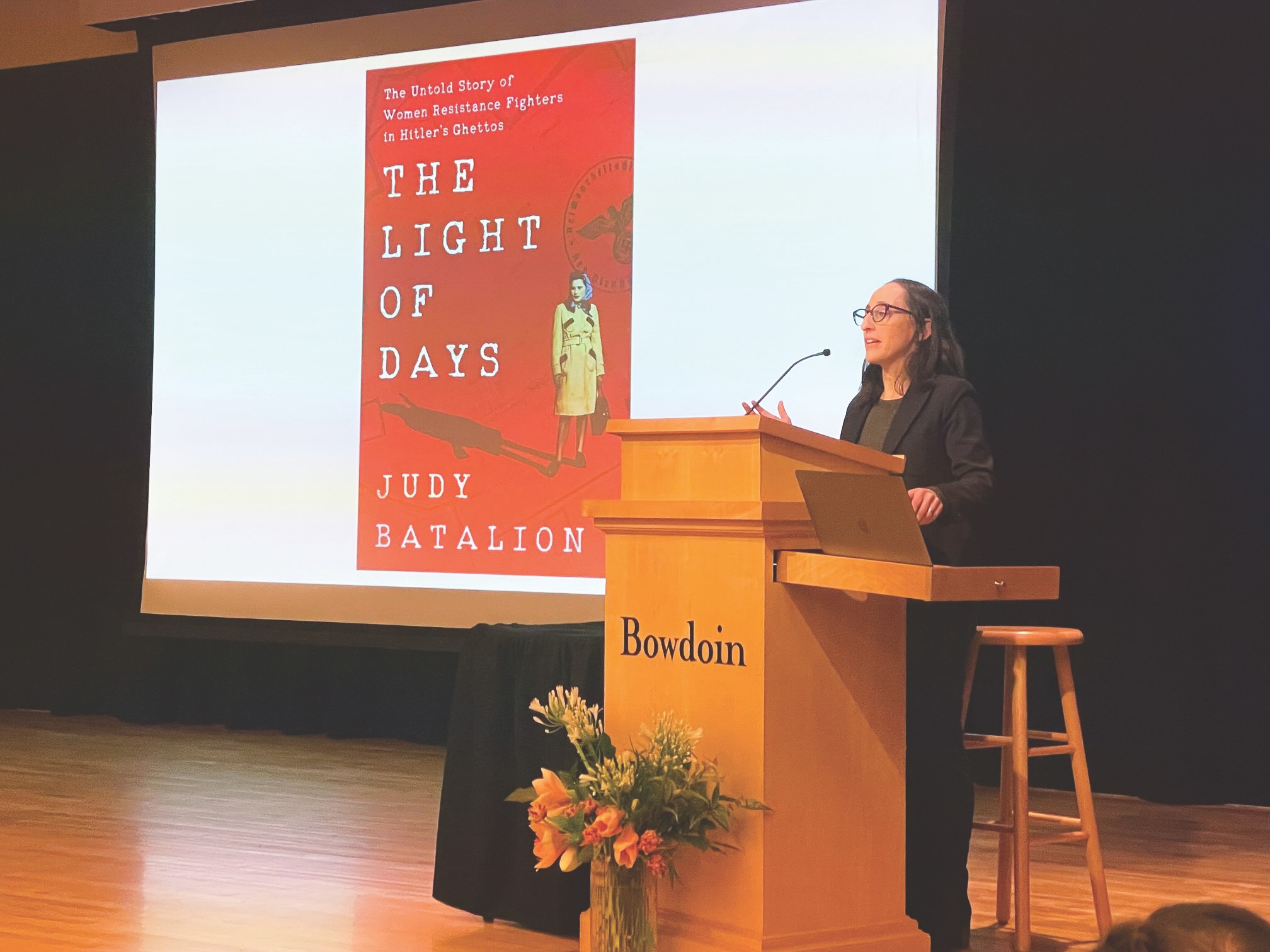Batalion presents on unapologetic Jewish womanhood
March 1, 2024
 Andy Robinson
Andy RobinsonStudents, faculty and community members came together on Wednesday night in Kresge Auditorium to celebrate the unapologetic fearlessness of Jewish women in the Holocaust through a discussion of Judy Batalion’s newest book, “The Light of Days: The Untold Story of Women Resistance Fighters in Hitler’s Ghettos.” The talk also addressed rising anti-semitism and its impact on the Jewish community.
Introduced by Assistant Professor of Environmental Studies and Government Shana Starobin, Batalion’s talk is part of the Bowdoin College Holocaust Education Lecture Series, sponsored by the Gabry Family Fund. “The Light of Days” is optioned by Steven Spielberg for a film adaptation.
Batalion, who grew up in a vibrant Jewish household speaking English, French, Hebrew and Yiddish, described her research process for the book, which began 17 years ago in the British Library where she initially discovered these stories. Eventually, she expanded her search across Europe, Israel and the United States, collecting the untold stories of Jewish women.
“These ghetto girls, as I came to call them, hid revolvers in teddy bears,” Batalion said. “They built elaborate underground bunkers. They bribed Nazis, and they shot them. They planned uprisings, they carried out intelligence missions, and they were the bearers of the truth about what was happening to the Jewish people.… I had never read anything like this.”
Over the course of an hour and a half, Batalion described how Polish Jewish women were uniquely suited to become resistance fighters due to a number of coinciding circumstances, including their strong cultural interconnectedness growing up in Jewish youth groups.
“These are intellectual, social, emotional and spiritual training grounds for young Jews,” Batalion said. “Their members used to joke that their last name was the name of their movement. They felt so deeply identified with these groups.”
Furthermore, Batalion described the various advantages that allowed Jewish women to integrate more seamlessly into Christian Polish culture.
“In Polish public school, women would learn to speak Polish … without the ‘creaky Yiddish accent,’” Batalion said. “So even if a man in the underground did a mission on the outside, a woman always went with him … And then on top of all this, Nazi culture was classically sexist. They never suspected that the sweet looking girl had a pocketful of ammunition, and Jewish women played to this underestimation all the time.”
Batalion focused on the stories of a few women, including Renia Kukielka. According to Batalion, Kukielka was a courier; she brought Jews living inside the Polish ghettos information and weapons, smuggling them in marmalade jars and fashionable handbags.
“Renia [didn’t look Jewish], so they asked her if she would be a courier,” Batalion said. “Being caught on the outside on the Aryan side meant certain death. Despite that, these young women dyed their hair blonde, took off their armband or Jewish star, put on fake smiles and pretended to be Christian.”
According to Batalion, many Jewish women who survived the Holocaust suffered from survivors’ guilt and hid their stories as they felt that they needed to start anew.
“They felt very guilty that they’d left their parents and their families to be in the underground; sometimes siblings were angry with them about it,” Batalion said. “They wanted to raise their children in normal, happy environments and so for many, many years, these formidable tales were buried. But of course, they always stayed close to the surface waiting to burst. These young Jewish fighters had lost everything and still they soldiered on.”
Batalion’s presentation strongly resonated with many community members, including Gail Kass, whose mother survived the Warsaw Ghetto and Nazi concentration camps.
“I wanted to see my family. I wanted to know that people haven’t forgotten, and that [Batalion] had studied so deep [was impactful],” Kass said.
Jacob Trachtenberg ’24, one of the presidents of Bowdoin Hillel, also said he was deeply impacted by Batalion’s talk.
“My great-great-grandmother died in the Warsaw Ghetto with her two daughters, and seeing Judy talk about women that resisted there was really emotionally intense for me,” Trachtenberg said.
Ultimately, despite the horrific and brutal circumstances these women faced, Batalion said she hoped that readers would understand their humanity and courage.
Batalion hopes people related to Holocaust survivors take pride in that fact.
“Like, my God, what amazing strength my family had, savvy and luck, but also courage, and they did that. You should be so proud of that. And I think we try to let that burn some fire in me,” Batalion said.

Comments
Before submitting a comment, please review our comment policy. Some key points from the policy: